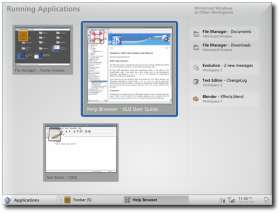The powers and savour of GNU/Linux have taken the attention of Oracle’s taste buds. Anything that reduces margins seems to make the founder, Larry Ellison, feel elated. And he’s no exception these days. Some months ago I heard the following joke (paraphrased below):
Q: What is the difference between God and Larry Ellison?
A: God does not think he is Larry Ellison.
Oracle is no longer waiting for a days of free beer (let alone Freedom, as in Free and free UNIX). Oracle reaps the crops which others have previously sown, throughout the early days of Linux. Oracle programmers do not share much of their work, despite their new Open Source strategy. Meanwhile, OSDL is being snubbed too, according to a recent interview. So what gives? Will Sun Microsystems go down a similar route with Java?
I sometimes think that Oracle executive need to sober up their mind (preferably with some rum) and give something in return. Linux could truly benefit from budgets as large as Oracle’s — budgets that expand owing to the competitive advantage one gets with Linux. Seeing the abuse they currently direct at Red Hat leaves nobody with impeccably-neutral thoughts, sentiments and Oracle affinity. The ethical issues that are tied to forking of Red Hat Enterprise Desktop/Server, as well as the inability to snatch JBoss for middleware, has left Oracle bitter. But it’s more akin to snobbery, as well as neglect of the roots that got Oracle where it is today (Oracle was among the earliest large adopters of Linux).

RedHat Linux
Will Oracle ever befriend Linux and actually prove that something can be given in return? At present, Oracle competes with and destroys some of the business that MySQL, Firebird, and PostgreSQL have conquered with Linux and pure Open Source software. This lack of moral values makes the mind boggle. Reciprocal benefit is just a belt-and-braces exercise given that Linux is out there begging for mere donations. What about assisting the giant whose shoulders you now stand on? Nobody can issue a cease-and-desist on the use of Linux and, in fact, with contributions to the kernel and even vocal appraisal alone, this can be seen as a form of advertising — a reciprocity.
I continue to perceive Oracle as somewhat of a Linux and Open Source parasite. Sometimes, more damage to reputation is done rather than the very contrary. Every once in a while somebody needs to crack that whip and knock some sense into those who only use Linux, accumulating enormous wealth and refuse to return anything, even when gently asked. Although there is no obligation (this is a clear point that frequently recurs in such discussions), there should be some sense of responsibility. You give and you get. FLOSS is community based, so the development of ‘lamer’ habits is dangerous. Let us all work together for the betterment of Linux.
Related item: Open Source and Paracites
From the press: Oracle #1 on Linux With More Than 80% Market Share
Oracle’s Linux commitment began in 1998 with the first commercial database on Linux. Today, only Oracle provides support for the complete software stack on Linux with applications, middleware, database and the operating system, including Red Hat, Novell/SUSE and Asianux. All Oracle products run on Linux, and Oracle Database on Linux meets the EAL4 Common Criteria…

 AST night I had my 2nd interview with google (a *nix systems administration position). What is noteowrthy is that I did not apply for a job. I was contacted by Google owing to my involvement and work on the Web. I am patiently waiting to hear their decision (should take several days), but I am pessimistic. Some questions were really hard and I needed hints. These questions were less analytical than I had expected.
AST night I had my 2nd interview with google (a *nix systems administration position). What is noteowrthy is that I did not apply for a job. I was contacted by Google owing to my involvement and work on the Web. I am patiently waiting to hear their decision (should take several days), but I am pessimistic. Some questions were really hard and I needed hints. These questions were less analytical than I had expected.





 Filed under:
Filed under: 
 TFM stands for “Read The Fine Manual”. But the letter “F” does not necessarily stand for “Fine”. This phrase, which is a popular support forums acronym, is often used in scenarios where a basic question is asked despite the fact that it can be easily answered given some minimal research effort.
TFM stands for “Read The Fine Manual”. But the letter “F” does not necessarily stand for “Fine”. This phrase, which is a popular support forums acronym, is often used in scenarios where a basic question is asked despite the fact that it can be easily answered given some minimal research effort.
 ERE is the latest find (a video) which illustrates how beautiful and powerful Linux has become. It is a showcase of
ERE is the latest find (a video) which illustrates how beautiful and powerful Linux has become. It is a showcase of 

 EEDS have improved the lives of everyone who wishes to be ‘on top of things’. But what tools should ideally be used? For syndication, I continue to use RSSOwl, as opposed to
EEDS have improved the lives of everyone who wishes to be ‘on top of things’. But what tools should ideally be used? For syndication, I continue to use RSSOwl, as opposed to 

 IGG.COM is a Web sites where more prominent news stories are voted for by a large pool of users. An
IGG.COM is a Web sites where more prominent news stories are voted for by a large pool of users. An